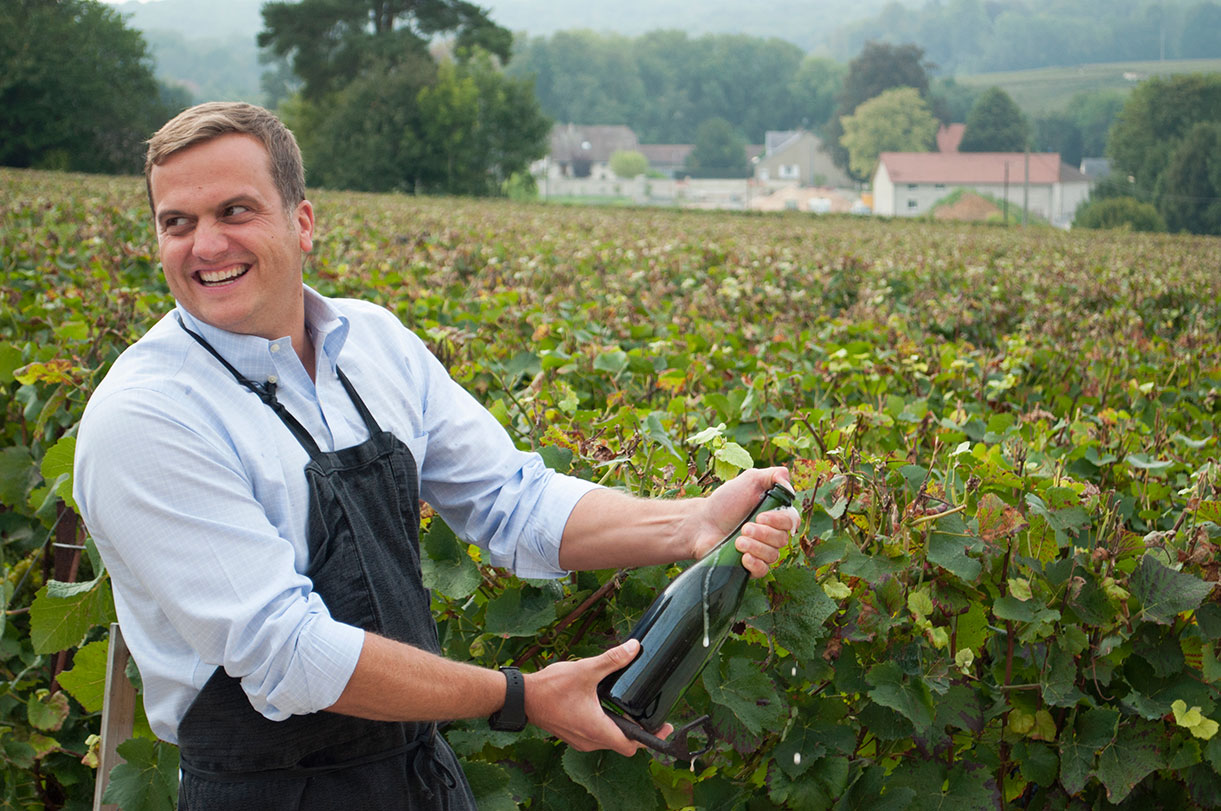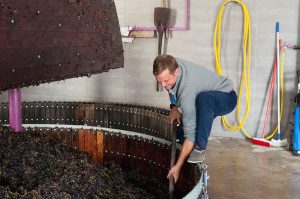Business success through bubbles and joy
 Imagine if more businesses were built to share bubbles and joy with the world. It’s fun to contemplate how a chief executive officer of such a company might spend his or her days.
Imagine if more businesses were built to share bubbles and joy with the world. It’s fun to contemplate how a chief executive officer of such a company might spend his or her days.
Meet Bryan Maletis (EMBA 2010), owner and founder of Fat Cork. For Maletis, the bubbles and joy are grower-selected bottles of champagne delivered monthly to a customer’s doorstep. And his days are spent sauntering through beautiful French vineyards talking with farmers about the latest grapes, or designing multi-million dollar strategies to improve an entire distribution model.
Maletis has a passion for making every day a celebration. Thanks to prior professional experience, personal interests and a well-rounded MBA education, Maletis has turned that passion into a successful international enterprise. Fat Cork, founded in 2010, is an exclusive importer and retailer of extraordinary, undiscovered grower champagne. His company is the only importer allowed to bring “the very, very best of the best” champagne into the United States.
 “It’s referred to as ‘grower’ champagne, because it comes straight from the families who grow the grapes,” Maletis explains. “They own the land, tend the vines and make the bubbly. Most have been at it for generations. We sell the bubbles and deliver the joy directly to the consumer through our Fat Cork website and our Fantastic Champagne (FC) Club.”
“It’s referred to as ‘grower’ champagne, because it comes straight from the families who grow the grapes,” Maletis explains. “They own the land, tend the vines and make the bubbly. Most have been at it for generations. We sell the bubbles and deliver the joy directly to the consumer through our Fat Cork website and our Fantastic Champagne (FC) Club.”
Maletis and spirits distribution go way back. In 1935, his family started a company now known as Columbia Distributing. Columbia distributes craft beer, wine and sodas to over 20,000 retail customers in the Northwest. “I grew up in a distribution family,” he shares. “As far back as I can remember, I worked in warehouses and on delivery trucks. Though we distributed many products, it was wine that always intrigued me. I spent time in the warehouse and would read family stories on wine labels while working.”
Through high school and during summer and winter college breaks, Maletis was employed at his family’s company. He worked hard and learned from the ground up the myriad aspects of the distribution business, including customer relations, models for delivery and, importantly, how to connect consumers with unique options. During those impressionable years, he grew more fond of the wines.
Maletis went to Loyola Marymount University to pursue an undergraduate degree. To better understand the business of wine, he took part in a study abroad program in Italy. “That was such a wonderful couple of months. I spent time with a family, on their farm, and picked grapes. It was incredibly eye-opening in terms of the family’s history and connection to the land and the traditions of what they produce.”
The experience stayed with him. “When I was done with college, I moved to New York and worked at a wine retail shop. I was 24 at the time, enjoying success on my own, not because I was tied to a family business. I loved how the retail environment directly connected me with customers and selling people bubbles: prosecco and champagne. I’d sell them a bottle and tell them not to wait for a special occasion to open it, but rather to open it to create an occasion. After enjoying a bottle, people came back to the store to thank me.”
Going to school wasn’t easy, but as an entrepreneur, I knew it would take me to where I needed to be.
Retail experience and extensive wine knowledge eventually led to a job as a brand manager for Champagne Laurent-Perrier. Capitalizing on how unaware Americans were about champagne, Maletis expanded insights about champagne production and distribution and took advantage of both challenges and opportunities. He admits that although he thrived in brand sales, made great contacts and liked his job, after several years of East Coast living, he wanted to be closer to home.
Maletis settled in Seattle and went back to work at his family’s business with regenerated sales and marketing skills. He focused on cultivating relationships with hotels and restaurants. He was happy being able to offer clients something unique, via champagne. He became known for his propensity for bubbles, and jokes, “I was a champagne advocate. All my clients tried it.”
Not long after moving to Seattle, Maletis met Abby Richardson, who eventually became his wife. During early dating days, their shared love of wine inspired them to plan a trip to France. This was their first vacation together and the first time either had been to the famous Champagne region of the country. The beautiful countryside, intimate farms and deliciously crafted bubbly all proved to be life changing.
While visiting the headquarters of Champagne Laurent-Perrier, Maletis met with a former colleague, the vice president of worldwide sales, Jean-Pierre Willemsen. They hit it off immediately over a bottle of rosé, as Maletis shared his views about the enthusiastic United States market for champagne. Willemsen agreed about the potential and they strategized possibilities for collaboration. They promised to continue the conversation after Maletis returned to Seattle.
Time spent understanding managerial accounting was invaluable. I studied it closely and that helped tremendously. We’re in our seventh year and as a result of my MBA, Fat Cork became profitable after only a few years. My background lessened the growing pains of owning my own business.
Abby sensed Maletis had entrepreneurial aspirations and encouraged him to go back to school to get his MBA. “Abby knew I had business ambitions. I was working for Columbia but wanted to get business experience to concentrate on working with some of the smaller boutique brands. My goal was to connect the amazing champagne crafted by truly localized producers directly to the customer. I wanted to do this by utilizing internet sales, which was a completely different approach from the business I grew up in.”
Maletis recognized an MBA was the link to realize the dream. He enrolled in the Executive MBA program in 2008. “I had the most incredible support,” he says. “Going to school wasn’t easy, but as an entrepreneur, I knew it would take me to where I needed to be. I was working a full-time job and had many study group meetings, and time with my then-fiancee was scarce. But it was wonderful. The students and professors worked closely together. We shared stories and hopes, ideas and challenges. We all had in common the crazy struggle for balance and were there for each other. Midway through the program, I got married.”
Despite his overloaded schedule, things began to fall into place. “In terms of business, school couldn’t have been more serendipitous,” Maletis recalls. “I was literally in the middle of taking an exam for Professor Bob Bowen’s class. My phone rang and I saw a French number. I’d been bugging Laurent-Perrier for a West Coast job and thought it was them. Instead, it was Jean-Pierre saying he’d started his own company exporting small producer champagne to Italy, and asking if I wanted to partner with him as the exclusive United States importer. My jaw dropped. I was so excited.”
“I called him back later and asked if he could wait a year so I could finish school and focus on learning how to structure a business. I wanted to go into this venture fully equipped, ready to disrupt the market. It was interesting because at the time, I was taking courses on international relations. These proved to be critical. The French way of doing business is different. For example, I’d thought about proposing exclusive agreements, but John-Pierre said, ‘No, the French don’t do business that way.’ He offered insights into more effective ways of approaching them, other ideas that were more culturally relevant. My international relations classes showed me the importance of recognizing that there are differences.”
 Maletis chuckles at how differences also showed up with the choice of Fat Cork as the company name. “After graduation, my cohort knew I was pursuing a champagne import business. I asked my team to vote on the name. Because of its silliness, Fat Cork was never taken seriously.”
Maletis chuckles at how differences also showed up with the choice of Fat Cork as the company name. “After graduation, my cohort knew I was pursuing a champagne import business. I asked my team to vote on the name. Because of its silliness, Fat Cork was never taken seriously.”
“I put suggestions up on a bulletin board and although other names were voted on, Fat Cork made the cut. When it came down to the top five, I checked website availability, and Fat Cork was the only one not taken. I knew it was the one. I shared the name with Jean-Pierre and he was aghast. He said, ‘You don’t you understand; champagne is high quality.’ Jean-Pierre couldn’t get past name. Now we laugh about it. The name is, of course, very American.”
Aside from understanding international differences, another aspect of the MBA experience that ensured business success was studying financials. Maletis says, “Time spent understanding managerial accounting was invaluable. I studied it closely and that helped tremendously. We’re in our seventh year and as a result of my MBA, Fat Cork became profitable after only a few years. My background lessened the growing pains of owning my own business.”
“I also use lessons from the negotiation course, especially ‘BATNA’, which is the mantra of ‘Best Alternative To Negotiated Agreement.’ In other words, if you’re going into negotiations with someone, what is your best outcome if you can’t agree on something? Always know the fallback position. This has resulted in creating win-win relationships—and with distribution, those are essential for long-term success.”
I didn’t feel ready to go back to school but the truth is, you never feel ready. You just have to do it.
Maletis feels grateful that despite the demands, he was able to obtain his MBA. He also recognizes and appreciates the depth of instruction he received. “We had hard times, but my wife was supportive and the rewards have been really great. I silently thank all my professors every day for their insights; Louise, Randall, Belina—the whole crew helped me make it. The teachers’ assistants were always available to answer questions.”
“Everyone involved with the Foster Executive MBA program makes investments in the students,” he observes. “They still invest today. They’re customers of mine, they buy our champagne, they invite us to speaking forums, they tell our story. I encourage people to go through the program. I didn’t feel ready to go back to school but the truth is, you never feel ready. You just have to do it.”
He concludes by sharing, “Life is never in perfect order. Like having a baby or even opening a bottle of champagne, don’t wait for the perfect moments. Create them.”
